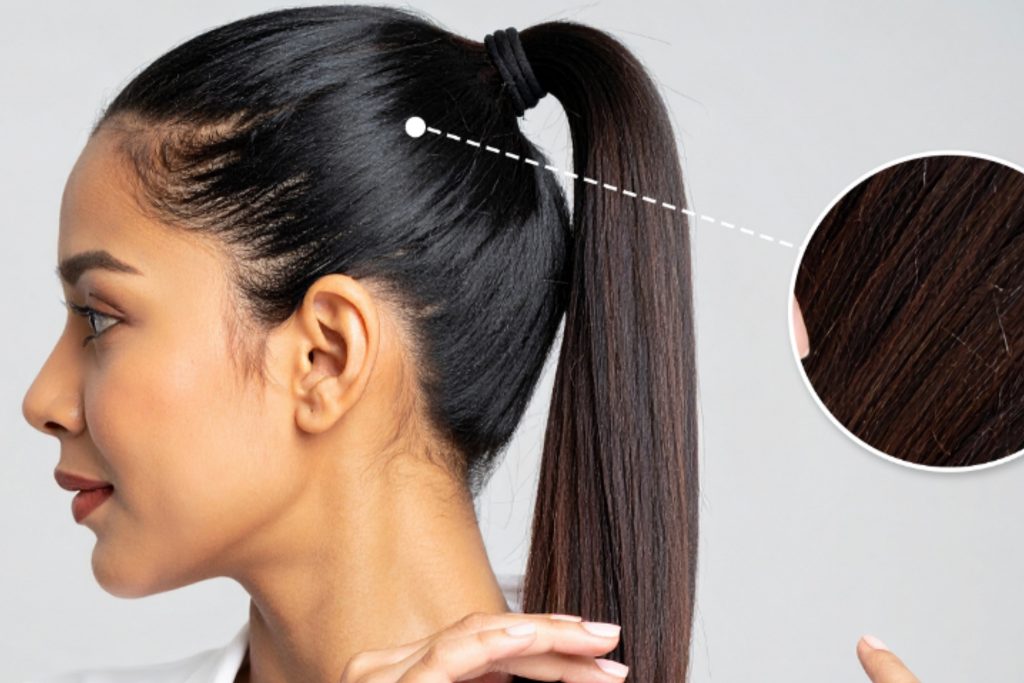The Truth about Traction Alopecia
Ponytails are practical, sleek, and often part of our daily routine. But behind the convenience, there’s a lesser-known concern: Traction Alopecia—a condition caused by repeated tension on hair follicles, potentially leading to thinning or even permanent hair loss.
If you’ve ever experienced soreness near your hairline, noticed hair breakage around your temples, or seen changes in your hair density over time, you’re not alone. And this is where early intervention and a supportive hair care routine become essential.
What is Traction Alopecia?
Traction alopecia is a form of mechanical hair loss caused by continuous pulling on the hair shafts. It’s most commonly triggered by hairstyles such as:
- High or tight ponytails
- Braids or cornrows worn for extended periods
- Buns and updos that put strain on specific scalp areas
- Hair extensions that weigh down the roots
Over time, repeated tension weakens the follicle, often starting around the temples & forehead and can result in visible thinning.
Can It Be Reversed?
The good news is that traction alopecia is often reversible in its early stages. Key signs to watch for include:
- Thinning around the hairline
- Tenderness or small bumps on the scalp
- Breakage and short, uneven hairs near tension zones
If addressed early—by releasing tension and applying restorative care—regrowth is possible. However, chronic stress can lead to permanent follicle damage and scarring, making early action essential.
Building a Preventive Routine from the Start
Before diving into the science, it’s worth noting that certain targeted scalp and hair care products can assist in maintaining follicle strength and minimizing inflammation—even as you adjust your styling habits.
Here are examples of dermatologist-recommended solutions designed to support scalp health and hair resilience:
- Aveil’s Hair Health Kit: Includes 6 daily strips of nutraceutical tablets that boost cell regeneration and provide nutrition to the hair, improving overall Hair Health.
- Aveil’s Nizoveil: Sulphate-free, calming cleanser ideal for scalps that experience repeated tension or inflammation.
- Aveil’s Minoveil Supports hair regrowth with its scalp-boost formula and lightweight texture.
These products support early-stage recovery and long-term prevention when used consistently.
What Else Can You Do?
In addition to using scalp-supportive products, dermatologists recommend:
- Rotating hairstyles and letting your hair down regularly
- Avoiding elastic bands with metal parts
- Never sleeping with tightly pulled styles
- Massaging the scalp gently to improve circulation
Where Aveil Fits In
The goal isn’t to rely on a product alone—but to build a hair care environment that allows your scalp to recover and your follicles to stay resilient. Brands like Aveil, which develop science-backed formulations in consultation with dermatologists, can play a meaningful role in that strategy.
Because traction alopecia begins at the scalp, addressing the issue with products focused on scalp health, circulation, and nourishment is a logical next step—not a last resort.
Your Takeaway
A ponytail by itself isn’t harmful—but repeating the same tight style daily, over months or years, can quietly impact your scalp health. If you’re noticing early warning signs, the best time to act is now.
With supportive styling habits and a consistent hair wellness routine, it’s possible to protect your follicles, encourage healthier growth, and prevent long-term damage. Aveil’s formulations are designed to complement this approach—not with overpromise, but with integrity and dermatological clarity.
For more information or to explore Aveil’s full hair and scalp wellness range, visit www.aveil.in.

